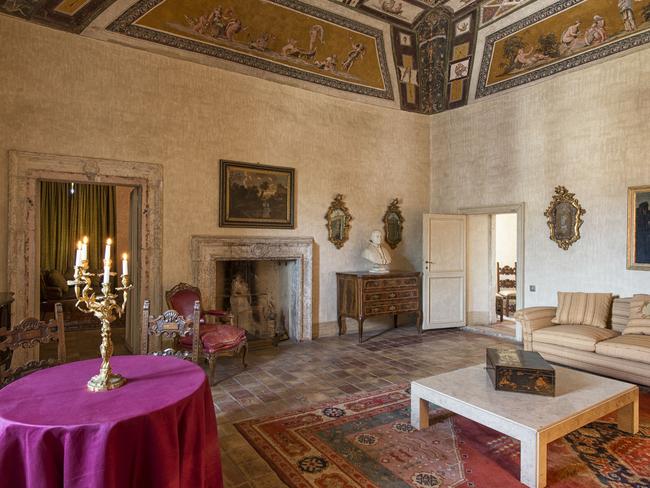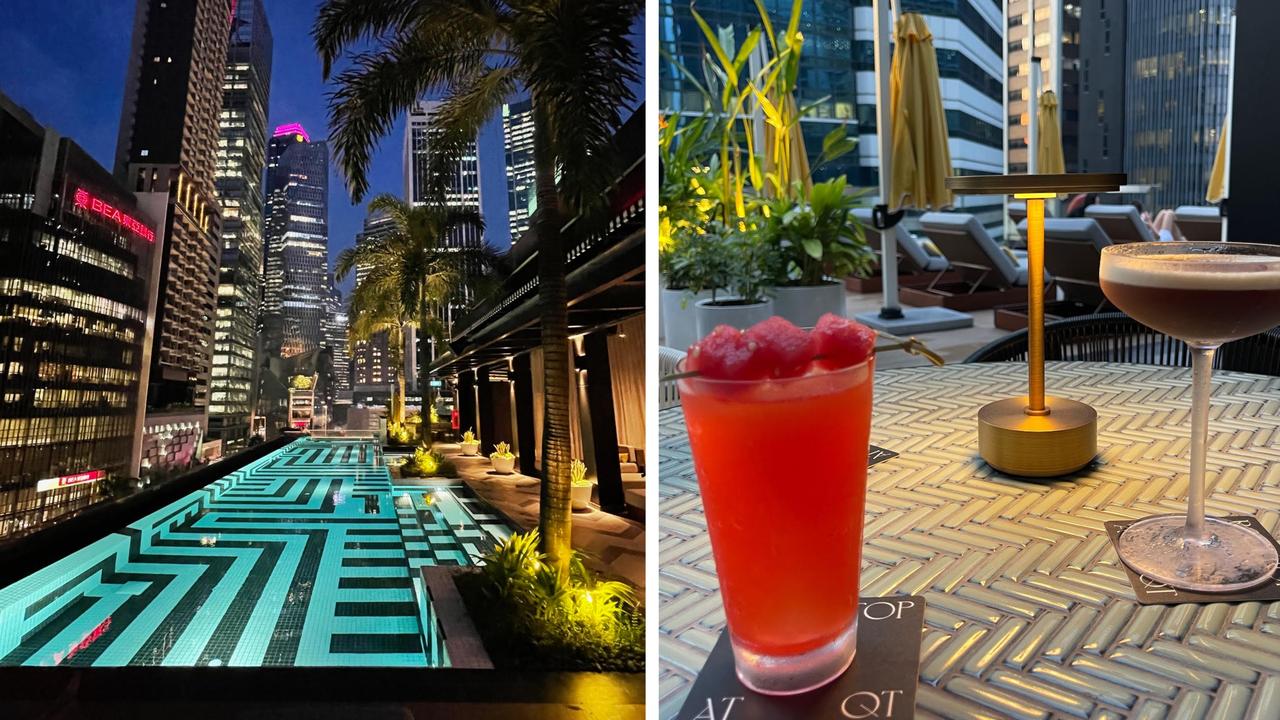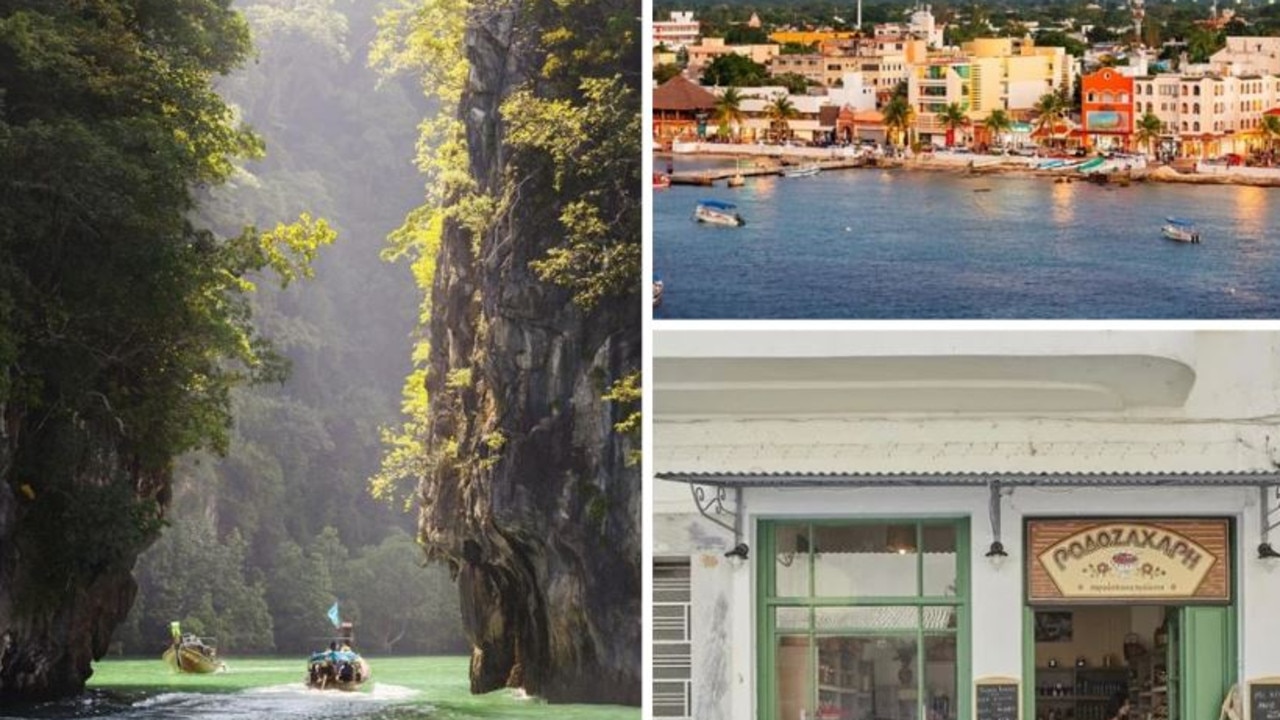Italian royalty have turned their palaces into hotels
EUROPEAN royals down on their luck have turned their incredible palaces into hotels. They’re like nothing you’ve ever seen.
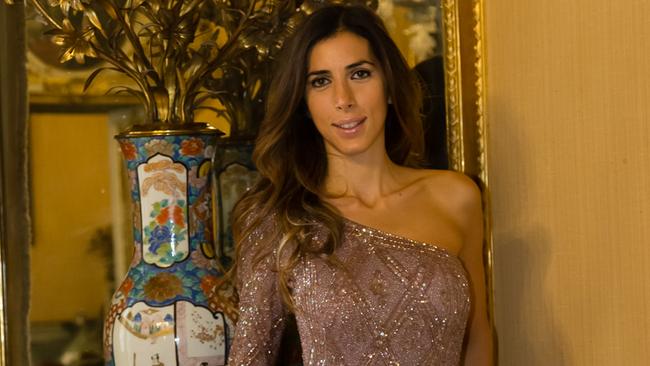
BEHEADED French King Louis XVI had a motto: “I love my people but please keep them away from me.”
How times have changed. With royal fortunes waning, titles going and castle maintenance too expensive, some of Europe’s royals are turning their luxury mansions into boutique resorts.
Rubbing shoulders with royalty, you get to holiday like a princess in mansions that used to be off-limits to the crowds, while aristocrats join you for cocktails on the balcony.
Staying at Ruspoli Bonaparte’s Renaissance palace, in the heart of Rome, is like living a fairy-tale. The Ruspoli belongs to so-called “Black Aristocracy” that rose to power thanks to the Vatican. Their lineage dates back to Charlemagne and boasts nine popes in the family tree.
Visitors are greeted by princess Maria Pia, a former Miss Sicily beauty queen and actress, and her young daughter Giacinta, named after a family saint.
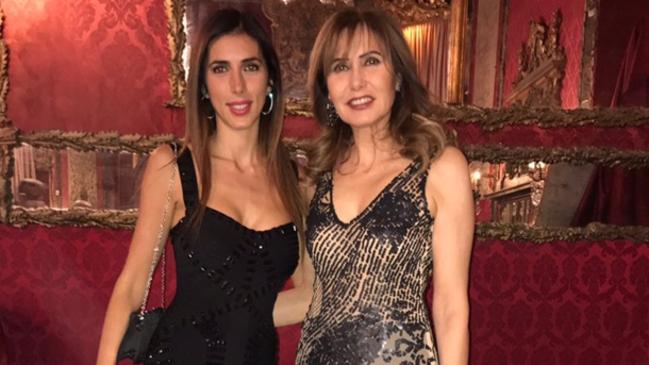
The royal family still inhabits one wing of the palace — where maids used to sleep — and are happy to share their house and “family treasures” with ordinary folk.
“Servants worked for free, today we must pay them 14-month salaries, severance pay and holidays. And they also grumble,” complains Giacinta.
All the money from renting the three glamorous suites — that are independent, 350 square metre apartments — goes into maintaining the building, where the old walls crack on a daily basis, and paying killer property taxes.
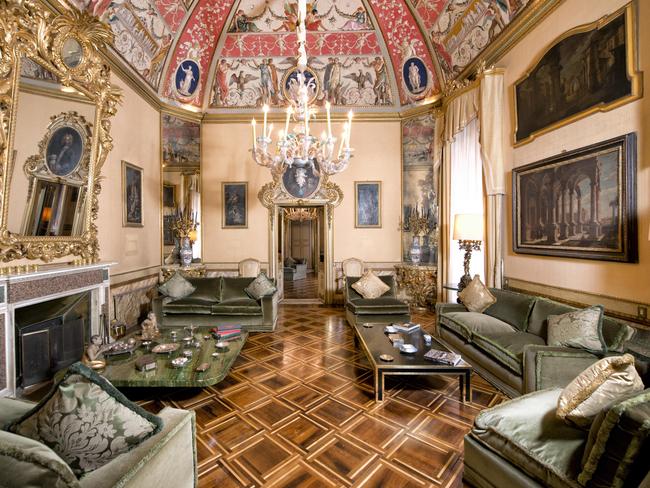
The palace boasts an entrance staircase made of unique marble stones that is worshipped as one of the “Four Wonders of Rome”.
The interior decor is pure luxury: Pistachio green canopy beds, plush purple sofas, silk wall papers, glass floors, crystal chandeliers and mirrors, wooden statues of Venetian Mores holding lamps and tables made of onyx, malachite and other precious stones. It’s like walking into a live museum.
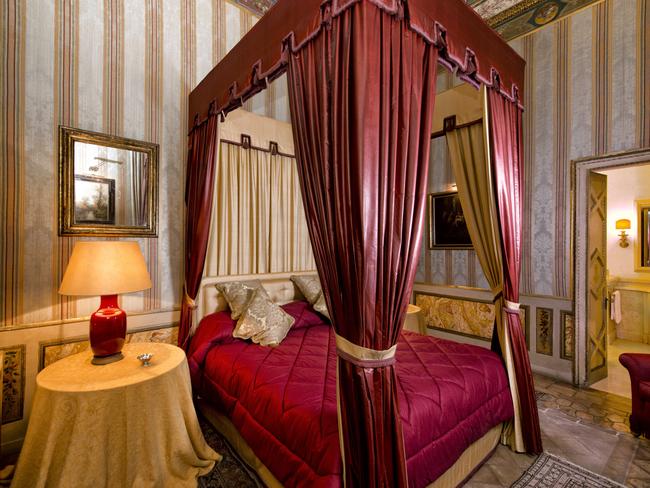
A patchwork of paintings makes visitors’ heads dizzy. Portraits of the Ruspoli ancestors hang on the walls, including those of 27-year-old Giacinta who gave up a career as lawyer to run the property.
There’s a terrace garden overlooking Rome’s picturesque rooftops, perfect for breakfast where you can suntan on lounge chairs during summer.
And don’t worry: There still are servants around to serve you loads of espresso and cappuccino with cornetti (Italian-style croissant) and whipped-cream maritozzi muffins.
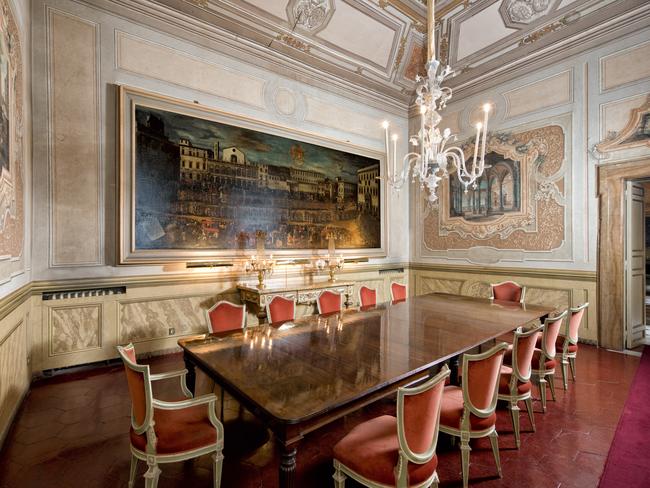
As I sit down with Giacinta and her mum for a cup of tea they tell me how their ancestors were bodyguards, who across eight centuries defended Holy Fathers from the enemy. In exchange for their loyalty and service they were rewarded with noble titles, lands and privileges.
Too bad many of those estates were taken away from them in 1946 when Italy voted against the monarchy in favour of the Republic, kicking the Savoy kings out of the country. Since then, noble titles are mere scraps of paper and being royalty has been tough.
“We don’t sit on thrones anymore. We have to roll up our sleeves each day and be inventive, turn our properties into a business, become entrepreneurs and hoteliers”, says Giacinta, who’s also a designer with a brand new clothing line.
So for just 350 euros per night you can sleep in the same suite where young French Emperor Napoleon III grew up together with his mother the queen in the 1800s. The little tyrant had the time of his life in Rome’s suburbs and taverns, hooking up with poor baker’s daughters, according to the two princesses.
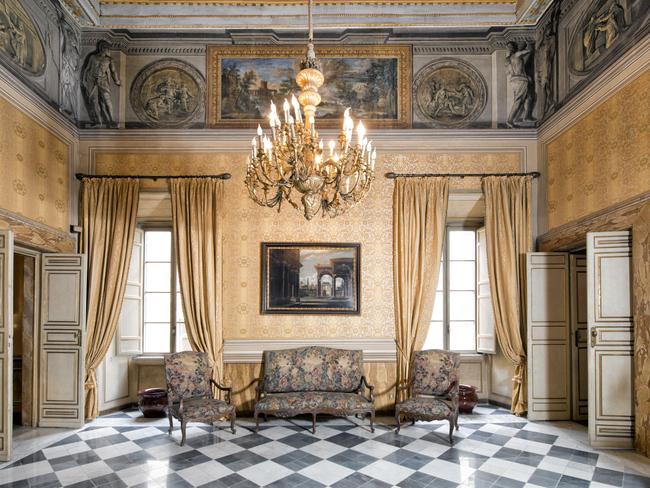
Aristocratic fortunes have shrunk but the Ruspoli are still quite fortunate. They’ve got more than one residence open to hospitality. Next I’m taken to visit their sumptuous summer castle in Cerveteri, an ancient town on the outskirts of Rome dotted with catacombs. “This is where we spend the hot months, like it’s been since centuries. It’s our break from city stress”, says princess Maria Pia.
For one night I get to be the only guest — the queen of the castle — sleeping in a huge fortress all by myself. I park my car at the entrance, in the middle of the medieval piazza. Giacinta hands me the keys to the heavy wooden portal and opens it.
I’m greeted by embalmed wild boar heads, eagles and cute-looking deers staring out at me from the thick stone walls of the main staircase.
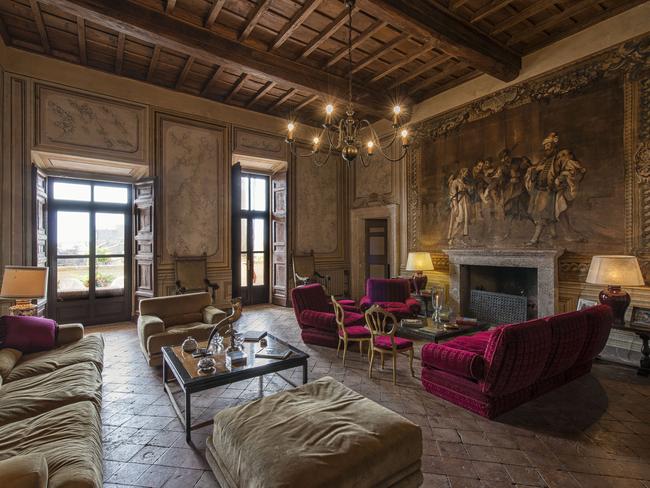
Back in the good old days the Ruspoli came here to hunt wild boars on horseback in the surrounding park with prelates, cardinals and popes. Today, what remains of that lush piece of land are a few hectares where guests are taken on guided walks, trekking tours and horse riding.
The fortress, built to prevent enemy raids into Rome, is embedded within the walls of Cerveteri, founded by the Etruscan people who were brutally wiped out by the Romans.
The castle is perched above a chasm — the so-called “Manganello Valley” shaped like a baton that divides the dead (the Etruscan necropolis in the background) from the living (the villagers and royals).
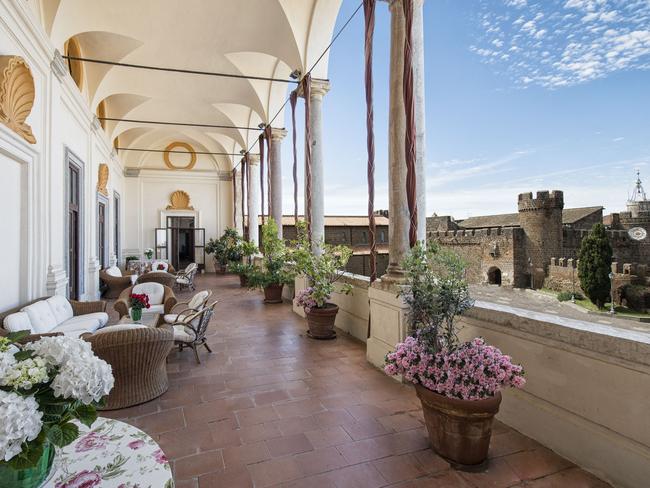
From the balcony the view stretches to the sea. The jewel of the castle is the outdoor loggia with arches and decorated columns covered in white linen curtains, perfect for evening drinks at sunset.
Upon request a lost world comes to life again. Giacinta organises gala dinners with ancient gourmet truffle and artichokes dishes in the company of actors dressed as medieval trumpeters, waving heralds and beating drums.
There are four royal suites for guests with a common hall featuring a ceiling-high chimney and 1500s tapestries. One room has a secret passage leading into the adjacent church that allowed royals the privilege of attending mass from a distant balcony, without having to mingle with the dirty, smelly and nasty peasants. It’s now been turned into a tiny gym, so you can burn some calories while praying and peaking towards the medieval altar.
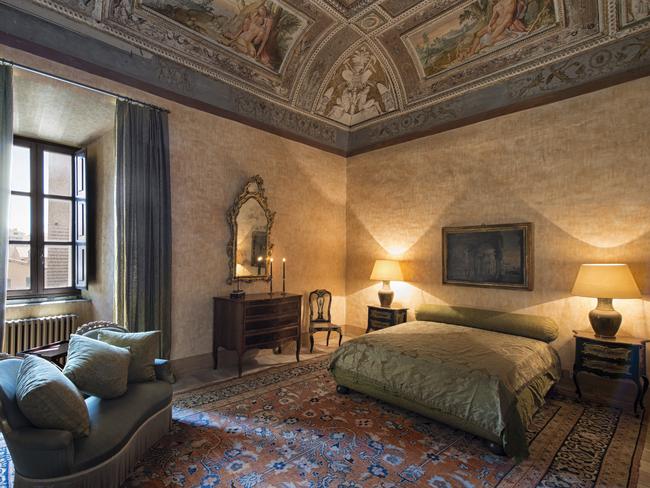
I’m given Diana’s Room for the night, covered in frescoes depicting sex scenes. There are bizarre paintings of grotesque monsters and of orgies between gods, sheep and women in bucolic settings. Goats and men embrace each other while Cyclops and Hercules fight. Royalty loved to be inspired by sensual images when it was time to get under the sheets.
However, my ecstasy is spoiled when Fabio the keeper tells me that the ghost of a murdered queen is said to haunt the Cerveteri castle and that several guests have had the pleasure to see her wander at night. A few even chatted with her.
“For centuries the poor lady’s blood stained the pavement but don’t worry, she only speaks to those who believe in ghosts”. When I return back to my suite for the night, after walking through dark and silent corridors with a torch in my hand, I lock the door.
